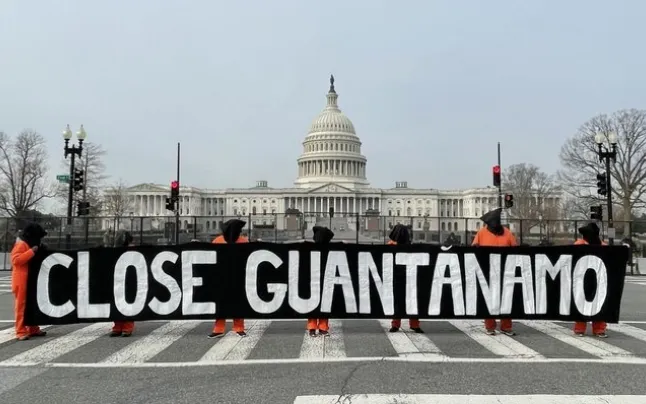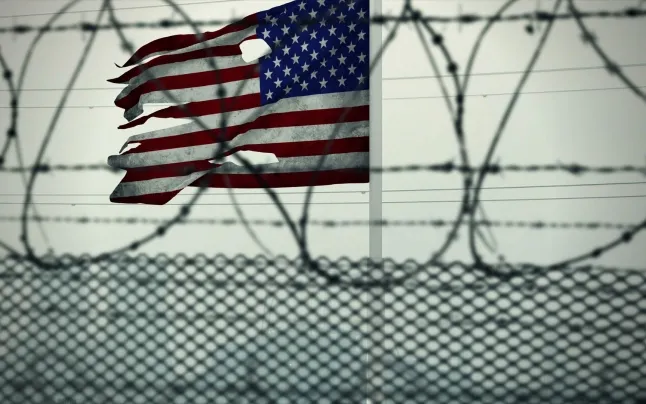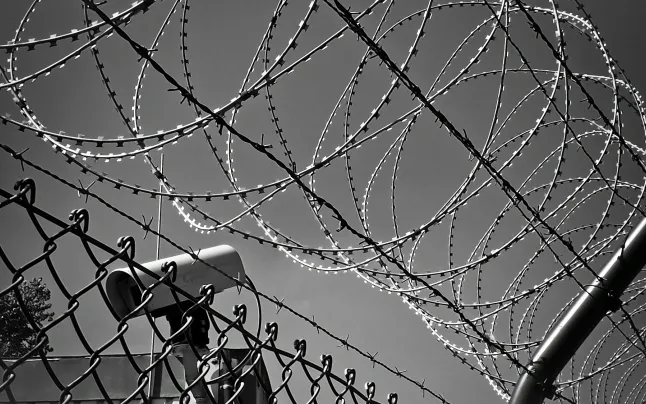Organizations such as Amnesty International have been calling for the closure of the controversial military prison, which has just turned two decades old.
The darkest legacy left by the George W. Bush administration's 'War on Terror' in response to the 9/11 attacks is the massive human rights violations committed in the name of fight against terrorism. There are many examples, but perhaps the most glaring symbol of this ignominy, what will remain for the history books, is the Guantánamo military prison.
January 2022 marks the twentieth anniversary of the opening of this controversial detention center, which has become a black hole in human rights that President Bush ordered in January 2002 outside the United States. naval base on the island of Cuba. A whole declaration of intent on what was to be done: a legal limbo to kidnap, guard, interrogate and torture alleged terrorists without going through the sieve of international law, war conventions and constitutional guarantees.
Since the first detainees arrived, locked in cages and dressed in orange frogs - another image for posterity - nearly 800 suspects of terrorist activities have passed through Guantánamo who have been subjected to all sorts of penalties and cruel and degrading treatment, many of them well documented. It's been twenty years, more than 7,300 days of injustice and human rights abuses. And the count continues to add up, as there are still 39 people locked up in the center today, most of them with no charges or trial in sight.
A prison that has survived all the presidents who wanted to close it
Since then, all U.S. presidents except Donald Trump have pledged to shut him down, but none of them have fulfilled their promise. Not even Barack Obama, who made the closure one of his flags.
"They always hide in political complications, security problems, they say that everything is very complicated and that the countries of origin of the detainees cannot accept them, however they are excuses that cannot justify in any case that Guantánamo remains open", says Blanca Hernandez, coordinator of Amnesty International's U.S. and Caribbean team.
Now it's the turn of Joe Biden, who was one of the people who worked actively to close the criminal controversy during Obama administration. "We will defend the rights of all those we bring to justice and close Guantánamo", he said in a speech at the Munich Security Conference in February 2009. Today, he has the opportunity to make those words come true.
His commitment doesn't appear to be as strong as Obama's, and the Guantanamo issue isn't a priority on his agenda. "Biden isn't publicly saying what steps he wants to take to close it, but we hope that he will resume this commitment, as he did in the Obama era, and listen to the pressure of all the people we are asking for the closure of the center", assures Hernández.
However, since taking over the presidency almost a year ago, Biden has only transferred one of the detainees from the military prison. Nor has he made any concrete gestures that suggest a quick solution to the Guantanamo issue. So far, for example, he has not reinstated the State Department's special envoy's office to close the facility, a figure that could help speed up the process.
On the contrary, one of the actions he has announced is the creation of a new courtroom at Guantánamo that will continue the work of the controversial military commissions, set up to try detainees and which have already proved ineffective and unfair, as they aren't trials that comply with the guarantees of a fair and impartial trial. "It doesn't seem like a good way to move forward, quite the opposite", laments Blanca Hernández.
Two decades of massive human rights violations
In these twenty years, the military prison has become an infamous icon of the disregard for the rule of law by a country that has always boasted of being a leader in defending the values of democracy in the world. This, of course, has had serious consequences for human rights principles on a global scale.
"It's a very serious stain on the role of the United States as a human rights defender, and what's worse, it has probably served many governments in other countries to justify human rights abuses and non-compliance of rules of the game; even war has laws, and the United States has not respected them", said Hernández.
In addition, as has been shown in several judgments of the European Court of Human Rights against Italy, Macedonia and Poland, among others, the US has implicated other countries and made them complicit in the violations of rights that have been perpetrated in Guantanamo. “This, obviously, has harmed the progress of human rights in the world because such basic things, assumed for decades, such as that torture is prohibited or that forced disappearance is a crime must be explained to society again, it is very worrisome," he stresses.
Guantanamo has ended up being a very heavy slab that has tarnished the image of the United States. It would be utterly unthinkable for the country to treat any American citizen the way it has done with detainees in military prison. In fact, this is one of the reasons why it was conceived and built outside the United States.
Similarly, inmates have never been considered prisoners of war for failing to comply with existing legislation. "They defined themselves as 'illegal enemy fighters', a term coined to have carte blanche and do whatever they wanted with it," said the AI coordinator.
Only accountability will bring justice
The result is well known: arbitrary detentions, enforced disappearances, abuses and hundreds of allegations of torture that have never been properly investigated. And the question is obvious: will anyone pay for these crimes? From AI they think it will be complicated, but they are clear that accountability is an essential part of getting justice done.
"We know it will be complicated, but organizations like ours and many more that we have been documenting cases for many years, there are also ex-detainees who have been able to begin to explain their experience and bring those responsible to justice", agrees Hernández, who points to the need for the United States to change its attitude on this issue, given that they have been one of the main obstacles to justice.
Either way, is Guantánamo an anomaly or are there more black holes like this in the world? Although Hernández is clear that this isn't the only illegal detention center - there are other documented cases such as that of Abu Ghraib, among others -, she believes it's a difficult question to answer: “I don't dare to say if there are more Guantánamos because it has very special features, but it is a symbol of a problem that goes far beyond the borders of Guantánamo itself.









Add new comment